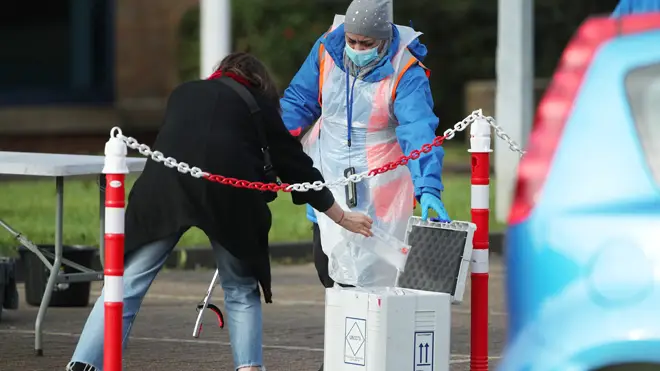
Paul Brand 3pm - 6pm
2 February 2021, 12:11 | Updated: 2 February 2021, 14:43

A "mutation of concern" has been detected in the Kent variant of coronavirus, scientists have said.
This mutation, known as E484K, is already present in both South African and Brazilian coronavirus variants and experts believe it could have an impact on the effectiveness of some Covid-19 vaccines. However, vaccines currently in use should still work, experts have said.
Laboratory studies have shown that antibodies are less able to bind to a part of the virus known as the spike protein, in order to stop it from unlocking human cells to gain entry.
READ MORE: Door-to-door testing to root out 'every single case' of South Africa Covid variant
It was previously thought this mutation was not present in the UK variant.

Professor Paul Hunter explains: Will Kent mutation evade immunity?
But a recent report published by Public Health England said gene sequencing has shown that the E484K mutation has occurred spontaneously in only a handful of cases of the UK variant.
READ MORE: South Africa variant testing - all you need to know
Dr Jonathan Stoye, group leader, Retrovirus-Host Interactions Laboratory at The Francis Crick Institute, said: "This suggests that the UK variant is now independently acquiring the E484K change.

Volunteer shows LBC how Covid home kit works
"From a virological standpoint, appearance of new variants by mutation during replication cannot be considered surprising.
"Whether this change will provide significant growth advantages for the novel virus causing it to predominate remains to be seen."
Up to January 26 this mutation has now been found at least 11 times in different cases of people infected with the Kent variant, Public Health England revealed.
Early results from Moderna suggest its vaccine is still effective against variants with this mutation - although the body's immune response may not be as strong or prolonged.
Dr Julian Tang, honorary associate professor at the University of Leicester, described the finding as "a worrying development, though not entirely unexpected".
He said it is important that people follow lockdown rules and get new cases of coronavirus down to prevent opportunities for the virus to mutate further.
Prof Tang said that allowing spread could provide a "melting pot" for different emerging variants.
He said: "We really need to reduce our contact rates to reduce the opportunities for viral spread (and) replication to reduce the speed with which these different virus variants can evolve."
A system of quarantine is due to be introduced in the coming weeks that will require those arriving from countries under travel bans to isolate in hotels.
Labour is pushing for strict hotel quarantine measures to apply to all UK arrivals.